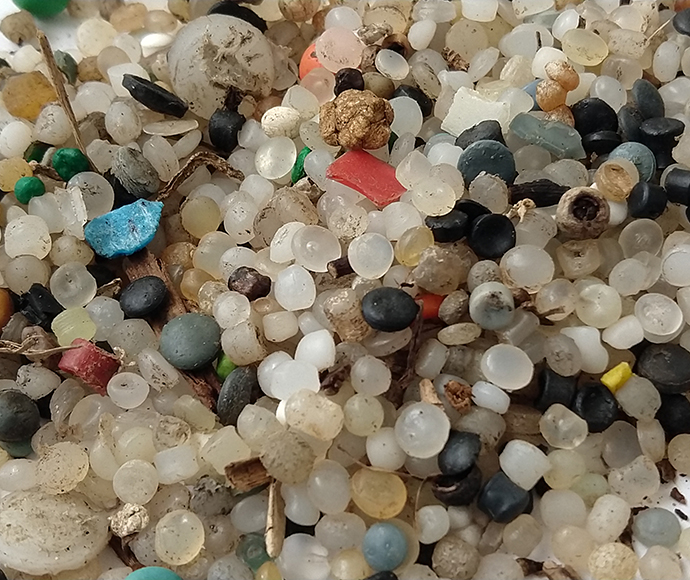Preventing plastic feedstock entering the environment
Plastic feedstock, such as flake, powder, recycled chip and resin pellets (also known as nurdles) are used to make plastic products.

- entering freshwater and marine environments
- attracting chemical pollutants to their surfaces
- being eaten by aquatic and marine animals that may become sick or die, and
- entering the food chain and impacting human health.
Spills and mishandling are the main cause plastic feedstock enters the environment, ending up in stormwater systems, waterways, and eventually the ocean. Once these materials get into the environment, removal is time consuming, expensive, and never entirely successful. Preventive measures are necessary to reduce these risks.
Industry must contain all plastic feedstock
Businesses that produce, transport or use plastic feedstock must keep it contained and under control. Plastic feedstock must not be:
- allowed to enter the stormwater system, or
- stored and handled in a way where it may fall, blow or be washed into waterways.
If you don't control your plastic feedstock you may be committing an offence. There may be significant fines if you allow plastic feedstock to enter the environment.
For example, loose plastic feedstock on the flatbed of your truck may fall or blow onto land or into waters and cause harm to the environment, attracting potential penalties.
Transport and handling require special attention with best practice procedures
Plastic feedstock most commonly enters the environment due to spills and leaks during transport and handling. When transporting plastic feedstock it is recommended to seal it in packaging strong enough to withstand the shocks, vibration, acceleration forces and loadings of transport. Make sure all people involved in transporting plastic feedstock understand the importance of preventing spills and know how to effectively clean up spills.
Pay particular attention during marine transport – any leaks are highly likely to directly enter the water. On ships, containers with plastic feedstock should be clearly labelled and stowed under deck or inboard in sheltered areas. Plastic feedstock should not be carried in bulk.
Good management practices can prevent plastic feedstock entering the environment
You should assess the risk of plastic feedstock entering the environment across the entire supply, production and recycling chain of your business. Look for places where feedstock may escape such as slopes, concourses, high wind areas, and unprotected drains. Control risks by:
- including specific controls in site environmental management plans
- implementing good housekeeping procedures
- agreeing appropriate packaging, transport and delivery procedures with suppliers
- training staff and contractors how to handle plastic feedstock (including spill capture)
- installing and maintaining control devices such as catch trays, bunded areas, wide mouth receivers and shoe brush stations
- installing and maintaining barrier curtains to prevent loss from inside areas to the environment
- ensuring outdoor bins and disposal areas are contained and lids closed
- installing and maintaining drain mesh guards, baffles, booms, and skimmers to cope with rainfall, and
- using conveniently located portable vacuums and cleaning equipment to quickly deal with spills.
For example, a spill is when a bulka bag has a tear where a large quantity of plastic resin pellets escape. A loss is the trickle effect of daily operations. Over time, both these types of loss accumulate and may cause harm to the environment.
Benefits for your business
By ensuring that plastic feedstock is managed appropriately, industry will:
- have a safer workplace by reducing slips and falls
- save costs
- reduce impacts on the environment and wildlife
- meet the expectations of the community, and
- avoid potential fines or prosecution for offences from mismanaging plastic feedstock.
Operation Clean Sweep® Australia has valuable and detailed resources on how to manage plastic feedstock.
Possible offences and fines for mismanagement of plastic feedstock
Businesses involved in the production, transport, storage, handling, use or disposal of plastic feedstock may be liable for enforcement action if they fail to manage the risk of plastic escaping into the environment.
In NSW, plastic feedstock is regulated under the Protection of the Environment Operations Act 1997. In most cases, your local council is the regulatory authority for plastic feedstock. The NSW Environment Protection Authority regulates businesses undertaking a scheduled activity and who have an Environment Protection Licence, or if a spill is an emergency pollution incident.
Possible offences include:
- a fine of up to $15,000 for an individual or $30,000 for a corporation if plastic feedstock causes pollution of land or waters. These fines may also apply to businesses with an Environment Protection Licence (EPL) who fail to comply with their conditions.
- Fines can reach up to $500,000 for an individual or $2,000,000 for a corporation if imposed by a Court, or more if the offence continues over time. This applies to pollution offences or businesses failing to comply with EPL conditions.
- There are more serious penalties for offences committed wilfully or negligently and that cause harm to the environment.
- The unlawful transport or storage of plastic feedstock that is considered “waste” (if it is discarded, rejected, unwanted, surplus or abandoned) may also form an offence.
The NSW Environment Protection Authority gratefully acknowledges the Environment Protection Authority Victoria for their permission to use their Managing plastic resin pellets (nurdles) factsheet (publication 1701) as the basis for this publication.